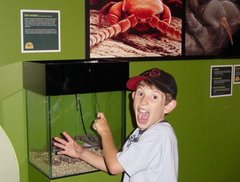Spent this morning at CECA. Have to take notes quickly so some will be abbreviated – hope you all understand!
Rick West, who I have long admired, gave the first keynote address at CECA. Called Native
America in Museums: The Passing of the Talking Stick, Rick discussed issues around who gets to talk at museums and the concepts of authority and representation. Change in view to idea that communities need to be involved in the work of the museum and in telling their own stories. Scholars have written that need to move museums beyond one-dimensional representation to multiple ones to fully represent the many diverse communities. He feels that US museums are well on their way to a position of shared authority. Motivation came from within the museum community itself, moved away from the metaphorical "temple". All people with legitimate claim may not view museum material in same ways as museum. Widening of concept of authority means museums are becoming different places. Programs based on shared authority widens museum's scope, with a direct benefit to the visitors. Museum as a true forum, gathering place for diverse views has a salutary impact on museums. Museums as forum draws it closer to the community of which it is a part. Becomes a public and civic space.
Experience of NMAI: Museum has a deep relationship with native peoples across North America who were involved in all aspects of development of the museum and shares authority with Native peoples. Five guiding principles for NMAI based on consultations with Native peoples:
- Community
- Locality – Indian land
- Vitality – we are here now
- Viewpoint – we know the world differently
- Voice – these are our stories
The next speaker was Martin Scharer from the Alimentarium, Vevey, who's paper title was Museums – places for merry discovery. Martin stated that he dislikes the term "learning" and that museums aren't places for learning (I beg to differ – see my thesis
J). Stated that people won't visit museums with boring learning materials – well, yeah! He also talked about the juxtaposition of boring learning and mindless entertainment. Again, he could read some work in my thesis on museums and dumbing down – it's on the wiki. I found the opposite: that visitors well-understood and appreciated the differences between learning, education and entertainment. One interesting part was the presentation of the different exhibition languages for enjoyment, knowledge, experience and thinking. We ran out of time which is a shame because I thought that could have been further explored.
The keynotes were followed by a panel discussing the key ideas of the morning. Cheers to Silvia Singer, one of the panellists, who stated that without the visitors museums are nothing! Objects are not the only way to showcase culture, many things are intangible and this shouldn't be dismissed. Bravo to you Silvia and great to see you here – you look terrific!
BTW I'm not being as good a blogger as I should be as I'm hanging out on Facebook – check me out Facebook | Lynda Kelly.
After morning coffee Graham Black from Nottingham Trent University gave a paper titled Creating a learning environment. It was a thrill to meet Graham as we had previously only corresponded via email when he was writing his wonderful book The Engaging Museum – check out more about Graham here. Going to take fast notes now:
- When planning for engagement need to look at the whole visitor experience
- Not just the responsibility of those with "learning" or "education" in their titles
- Factors in developing a learning environment:
- Provide stimulus to visit in first place – positive image, arriving expecting to engage
- Keep visitors in right frame of mind – first impressions vital; create informal, user-friendly atmosphere; key role of FOH staff; minimise user effort
- providing opportunities and support to engage – encourage reflection
- Enable follow-up – potential of the web
- Provide stimulus to visit in first place – positive image, arriving expecting to engage
- Graham offered to email people his paper – so email him Graham Black



1 comment:
I agreed that community should be one of the knowledge sources for exhibition inperpretation. To exhibition or activities, we need the conversation rather monolog. In my proposal of the thesis, I also cited similar concepts and opinions to emphasize the voice of communities (in the case study of my proposal, the concept of community tends to 'community of practice' which the vocational group of harbour affairs and shipping), and to challenge whether museum exhibitions could attract them as well as really reflect their stories or not.
I'm glad of your share about the outline of this speaker's thesis.
May I have a copy when you return to Sydney?? :)
By the way, I can't sbuscribe your blog via AM's computer, and will try again at home.
Please say hello to my teacher if you meet her. 3Q
Tzu-yu
Post a Comment